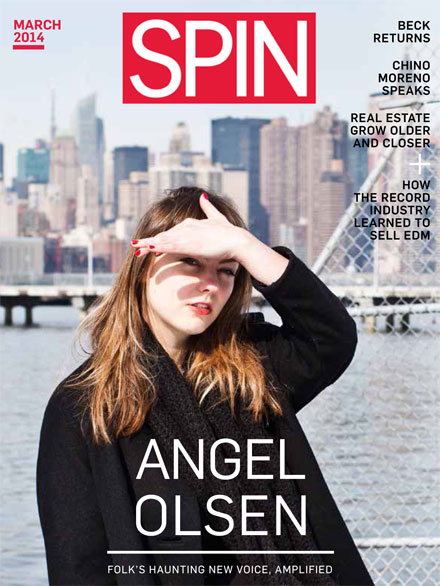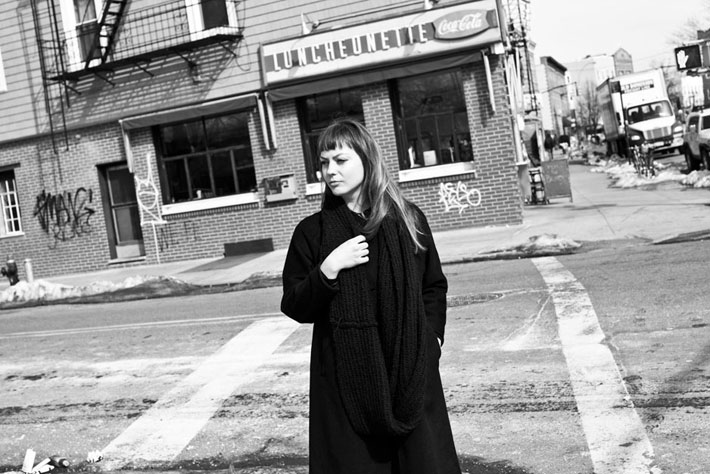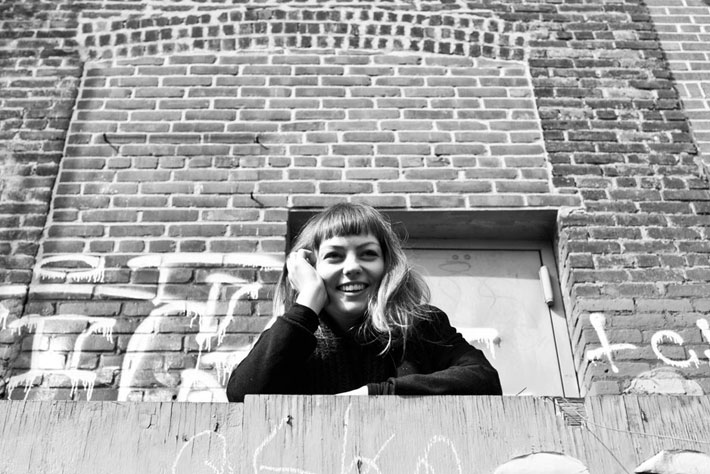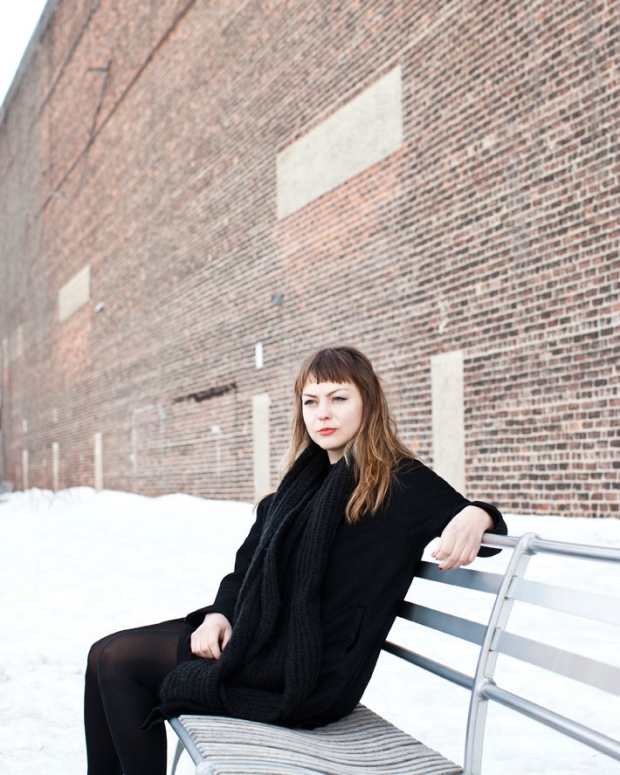On a wet Friday morning, one week before Valentine's Day, Angel Olsen receives an unexpected e-mail from a friend named Sergio. "He's asking me if I want to come to an island somewhere off the coast of Portugal," she says, lips tightly pursed. "He wants to know if I'd like to record there for two weeks, in a studio, for free. It sounds great, but you read something like this and you're like, 'What's the catch, exactly? Why me? Why do I deserve this?'"
Sergio and his wife live in Lisbon, where they run Galeria Zé Bois, or ZDB, a non-profit art center housed in a gargantuan 18th-century palace. For years, he's been booking European shows for Will Oldham, the American folk iconoclast with whom Olsen began working, harmonizing, and touring the world when she was 23. While she says it's unlikely that she'll be able to take Sergio up anytime soon, her last two questions are easily answered: He's clearly heard her sing.Because Olsen, now 27, has a voice that can trigger a collision of feeling. Consider "Hi-Five," from her sophomore LP Burn Your Fire For No Witness, a thrilling number in which she pays Patsy Cline-like homage to Hank Williams at its opening ("I'm so lonesome I could cry") and offers revelation at its summit. "Are you lonely, too?" she asks, a whisper before a thunderclap. "High five! So am I!" At this particular moment, the dagger-eyed singer-songwriter is stirring in her new home in Asheville, North Carolina, packing a bag to take with her to High Five, a coffee shop we'll walk to not because of said song's title, she swears, but simply because she likes the coffee. It's unusually cold in Asheville right now, a storm having left a thin coat of ice on the Blue Ridge as it passed through in the night. And Olsen, bleary-eyed in a black wool sweater, was up late with a small group of friends, hand-rolling T-shirts to be sold on an extensive headlining tour of North America and Europe that will take her away from Asheville for much of the next four months, in support of Burn Your Fire For No Witness, a feverish set of high-wire torch songs that doesn't deserve an audience so much as it cautiously demands one. Recorded here last summer, it's the first album she's written since leaving Oldham's outfit in the summer of 2012, and the first she's recorded while leading a band of her own, in this artist-friendly mountain town she decided she'd make her home a few months later.In a week, her bandmates will arrive from Chicago for a handful of rehearsals before they embark on tour. To help with the driving, she very recently and reluctantly obtained a North Carolina driver's license — her first since allowing her Missouri license to expire five years ago, not long after she'd left her hometown of St. Louis for the Windy City. In the past year, as her small but passionate following has grown exponentially in size, she's quickly been forced to reconsider her art: its value, its needs, and the ways in which she relates, as a writer and performer, to the absurdity of the idea that making records could change her life so much in such a short period of time. She now has a fan that one could, not unkindly, deem a stalker. She now has, much to her surprise, a team of people working for her, and a newly minted LLC in her name. She has no car, no clear sense of Asheville just yet. She has a long, handwritten list of medical debts hanging on her refrigerator door. She is a self-described "dumb-ass," who, for the first time, can show fellow musicians the world like Oldham once did for her."I wouldn't normally do this," she says as we walk, "but two days ago, I got a massage." She laughs at herself. "It's the stress: Maybe I'll never get to make another record; maybe I should just enjoy this. Because all of it wavers on whether or not people find my music and my thoughts interesting. That's my life: It's pretty fucked up, if you think about it."
At this particular moment, the dagger-eyed singer-songwriter is stirring in her new home in Asheville, North Carolina, packing a bag to take with her to High Five, a coffee shop we'll walk to not because of said song's title, she swears, but simply because she likes the coffee. It's unusually cold in Asheville right now, a storm having left a thin coat of ice on the Blue Ridge as it passed through in the night. And Olsen, bleary-eyed in a black wool sweater, was up late with a small group of friends, hand-rolling T-shirts to be sold on an extensive headlining tour of North America and Europe that will take her away from Asheville for much of the next four months, in support of Burn Your Fire For No Witness, a feverish set of high-wire torch songs that doesn't deserve an audience so much as it cautiously demands one. Recorded here last summer, it's the first album she's written since leaving Oldham's outfit in the summer of 2012, and the first she's recorded while leading a band of her own, in this artist-friendly mountain town she decided she'd make her home a few months later.In a week, her bandmates will arrive from Chicago for a handful of rehearsals before they embark on tour. To help with the driving, she very recently and reluctantly obtained a North Carolina driver's license — her first since allowing her Missouri license to expire five years ago, not long after she'd left her hometown of St. Louis for the Windy City. In the past year, as her small but passionate following has grown exponentially in size, she's quickly been forced to reconsider her art: its value, its needs, and the ways in which she relates, as a writer and performer, to the absurdity of the idea that making records could change her life so much in such a short period of time. She now has a fan that one could, not unkindly, deem a stalker. She now has, much to her surprise, a team of people working for her, and a newly minted LLC in her name. She has no car, no clear sense of Asheville just yet. She has a long, handwritten list of medical debts hanging on her refrigerator door. She is a self-described "dumb-ass," who, for the first time, can show fellow musicians the world like Oldham once did for her."I wouldn't normally do this," she says as we walk, "but two days ago, I got a massage." She laughs at herself. "It's the stress: Maybe I'll never get to make another record; maybe I should just enjoy this. Because all of it wavers on whether or not people find my music and my thoughts interesting. That's my life: It's pretty fucked up, if you think about it."
https://cache.vevo.com/m/html/embed.html?video=US38Y1424415
 What she e-mailed him would eventually become her debut, Strange Cacti, a simple, six-song collection in which her voice — ululating, warbling, yodeling, obliterating — often felt transcendent: at once impossibly close and painfully distant, new and antique, feminine and masculine, immediate yet uncompromising. When asked what he hears when he listens to Olsen now, years later, Hency's response is concise: "Life. There's so much life in her music."While in Chicago, Olsen began playing and recording with Cairo Gang leader and guitarist Emmett Kelly, who would pass along her music to Oldham, a legendarily eager collaborator. They asked her to join the Babblers, a mysterious outfit they'd created in tribute to Kevin Coyne and Dagmar Kraus' 1979 LP, Babble. Together, the three of them would dress up in pajama jumpsuits and sunglasses, for cover sets that would eventually precede collaborative performances between Oldham (operating under his Bonnie "Prince" Billy guise) and Kelly's Cairo Gang. Olsen, 16 years Oldham's junior, was asked to harmonize with him each night; her contributions enriched but never overwhelmed. It was her first experience with touring, and when it came time to record his 2011 LP, Wolfroy Comes to Town, Oldham asked her to do the same in the studio. She did.That platform provided her an audience outside of Chicago that she'd never had before. The next year, in late 2012, she released Half Way Home, a proper full-length debut, on Bathetic, combining songs she'd written long before and some she'd written while on the road with Oldham, recorded with Kelly between tours. Its gorgeous closing number, "Tiniest Seed," uses harmonizing as a heavy-hearted metaphor for relationships, for feeling both connected and alone. Critics crowed; listeners beyond the cloistered circles of experimental-music fans her label catered to took note."There are so few voices that possess that effortless evocation," Carrie Brownstein, Portlandia co-creator and former Sleater-Kinney co-frontwoman, told me. "It has a sort of oozing, viscous quality: sexy, gritty, melancholy. She's someone who can tell an entire story with the sound of her voice."
What she e-mailed him would eventually become her debut, Strange Cacti, a simple, six-song collection in which her voice — ululating, warbling, yodeling, obliterating — often felt transcendent: at once impossibly close and painfully distant, new and antique, feminine and masculine, immediate yet uncompromising. When asked what he hears when he listens to Olsen now, years later, Hency's response is concise: "Life. There's so much life in her music."While in Chicago, Olsen began playing and recording with Cairo Gang leader and guitarist Emmett Kelly, who would pass along her music to Oldham, a legendarily eager collaborator. They asked her to join the Babblers, a mysterious outfit they'd created in tribute to Kevin Coyne and Dagmar Kraus' 1979 LP, Babble. Together, the three of them would dress up in pajama jumpsuits and sunglasses, for cover sets that would eventually precede collaborative performances between Oldham (operating under his Bonnie "Prince" Billy guise) and Kelly's Cairo Gang. Olsen, 16 years Oldham's junior, was asked to harmonize with him each night; her contributions enriched but never overwhelmed. It was her first experience with touring, and when it came time to record his 2011 LP, Wolfroy Comes to Town, Oldham asked her to do the same in the studio. She did.That platform provided her an audience outside of Chicago that she'd never had before. The next year, in late 2012, she released Half Way Home, a proper full-length debut, on Bathetic, combining songs she'd written long before and some she'd written while on the road with Oldham, recorded with Kelly between tours. Its gorgeous closing number, "Tiniest Seed," uses harmonizing as a heavy-hearted metaphor for relationships, for feeling both connected and alone. Critics crowed; listeners beyond the cloistered circles of experimental-music fans her label catered to took note."There are so few voices that possess that effortless evocation," Carrie Brownstein, Portlandia co-creator and former Sleater-Kinney co-frontwoman, told me. "It has a sort of oozing, viscous quality: sexy, gritty, melancholy. She's someone who can tell an entire story with the sound of her voice."
But part of Olsen's allure was and is that her own story seems so tightly woven into every word she sings, that she makes us believe her feelings arrive completely unfiltered, without artifice. "I'm not afraid of revealing myself," Olsen says. "For the sake of being a little embarrassed sometimes, why not write about things that people don't write about?"
Eventually, she adds, she had to decide whether or not she'd do that for herself, or to continue to sing someone else's songs for them. "I ended up feeling like I was cheating myself by not following my own course," she says, of parting ways with Oldham. "By not taking my own chance, by not doing what he was doing, but for myself." The parting was amicable but awkward, in the way their off-stage partnership seems to have been. Upon receiving a text message from her team later in the day, asking if she thought they should send Oldham a copy of Burn Your Fire, Olsen balked. "I don't know," she told me as she thought aloud. "I don't want to be selfish. He sort of extended his insight, told me that if I ever have any questions, about anything, I could call him. But he's one of the most challenging people to talk to sometimes. I wonder if he knows what's going on with me, but at the same time, I hope that he's not being judgmental. He probably is."

 When Olsen and her band weren't recording, they'd get cheap drinks in unfamiliar bars and attend bowling nights with their hosts. With Burn Your Fire Olsen eventually left with a record she says felt wholly representative of her vision, a set of songs that take on the shape and skin of punk and country and folk music, sung through a slew of different microphones. Declarations of independence are often bracing, but rarely do they illuminate so ferociously the lonesome reality of being on your own. "It's sort of childish," she adds, "but I got exactly what I wanted."When she and her band rolled back into Chicago, the first thing she thought was, "This town stinks." For months she threatened Capon and Hency, already an advocate, with coming to Asheville indefinitely. And in November, before she'd find the place not far from downtown where she's living now, Schnabel gave her a place to stay, in the ranch house he heats entirely by firewood. "I had to tend it," she says of the fire. "I had to learn how to stay warm and I spent a lot of time chopping wood. In some ways it was annoying, but in some ways I really appreciated it. It's totally different in a city. When you have to go through the process of taking care of yourself on that level, it feels like you're really doing something, like each day is living."On Sunday night, they'll get together again, at Capon's, to watch True Detective and Girls, a recently developed tradition in which they all sit down with their own individual pint of Ben & Jerry's ice cream as they watch. Now that she's living in Asheville, it's become more difficult to go home — this past Christmas, for the first time, she spent the holiday among friends. "It's almost like you realize early that the people that love you and care for you, even if they're not related to you, can be your family," she says. "And I think that's a good thing to realize pretty early on."Halfway through the third band and final band’s set, Capon says he's ready to go, suggests we all get one more drink elsewhere. He notices that Ryan, a younger Harvest employee, is drinking water. "Are you done drinking for the night?" he asks him."Yeah," Ryan says, biting down on some ice, "I've gotta get home. I've got Angel records to pack."
When Olsen and her band weren't recording, they'd get cheap drinks in unfamiliar bars and attend bowling nights with their hosts. With Burn Your Fire Olsen eventually left with a record she says felt wholly representative of her vision, a set of songs that take on the shape and skin of punk and country and folk music, sung through a slew of different microphones. Declarations of independence are often bracing, but rarely do they illuminate so ferociously the lonesome reality of being on your own. "It's sort of childish," she adds, "but I got exactly what I wanted."When she and her band rolled back into Chicago, the first thing she thought was, "This town stinks." For months she threatened Capon and Hency, already an advocate, with coming to Asheville indefinitely. And in November, before she'd find the place not far from downtown where she's living now, Schnabel gave her a place to stay, in the ranch house he heats entirely by firewood. "I had to tend it," she says of the fire. "I had to learn how to stay warm and I spent a lot of time chopping wood. In some ways it was annoying, but in some ways I really appreciated it. It's totally different in a city. When you have to go through the process of taking care of yourself on that level, it feels like you're really doing something, like each day is living."On Sunday night, they'll get together again, at Capon's, to watch True Detective and Girls, a recently developed tradition in which they all sit down with their own individual pint of Ben & Jerry's ice cream as they watch. Now that she's living in Asheville, it's become more difficult to go home — this past Christmas, for the first time, she spent the holiday among friends. "It's almost like you realize early that the people that love you and care for you, even if they're not related to you, can be your family," she says. "And I think that's a good thing to realize pretty early on."Halfway through the third band and final band’s set, Capon says he's ready to go, suggests we all get one more drink elsewhere. He notices that Ryan, a younger Harvest employee, is drinking water. "Are you done drinking for the night?" he asks him."Yeah," Ryan says, biting down on some ice, "I've gotta get home. I've got Angel records to pack."



